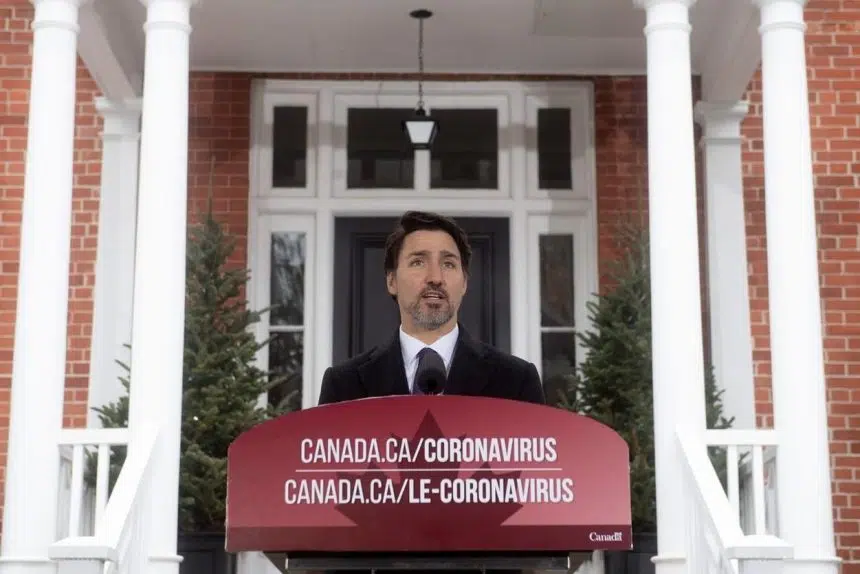OTTAWA — Prime Minister Justin Trudeau says lockdowns in other countries and air-space restrictions due to COVID-19 mean Canada won’t be able to get every citizen home who is trapped abroad.
Trudeau urged the tens of thousands of Canadians currently stuck in foreign countries to make safe decisions, stay in touch with Global Affairs and not head to airports unless they have a confirmed seat on a flight back.
“It is an extremely difficult situation but the lockdowns of various countries, the limits on air travel, the logistical capacities of our airlines means that we are unlikely to bring everyone home,” Trudeau said Saturday.
“So we are going to ask people to stay safe, to make smart choices and do the best they can in a situation that is unprecedented, exceptional and very difficult.”
Trudeau said the federal government is working with airlines to arrange flights to countries where Canadians are. The government is stressing that their priority is helping people in countries where commercial options are not available, because of closed borders, airspace or airports.
An Air Canada flight bringing a group of Canadians home from Morocco is expected to land in Montreal Saturday evening and others from Peru and Spain are likely to be announced soon.
Foreign Affairs Minister François-Philippe Champagne said he has been given reassurance from Peru that a flight would be allowed to leave for Canada despite the Peruvian defence minister saying Saturday would be the final day the country allows repatriation flights.
Trudeau said the government will help cover some of the costs for these flights, but passengers would be expected to pay a reasonable price.
The World Health Organization figures show there were nearly a quarter million cases of COVID-19 worldwide as of Friday and the global death toll was approaching 10,000. There were more than 1,100 confirmed and presumptive cases in Canada as of Saturday. Ontario reported 59 new cases Saturday morning.
The situation has prompted countries around the world to clamp down on travel both within communities and across international boundaries.
Canadians themselves woke up Saturday to a new reality: the world’s longest undefended border is no longer open for routine, casual traffic between Canada and the United States.
The ban on non-essential cross-border travel went into effect at midnight ET and will stay in place for at least 30 days as both countries scramble to curb the rapid spread of COVID-19.
The ban applies to people wanting to cross the border for tourism or purely recreational purposes, such as shopping.
It is not supposed to impede trade or essential travel, but what constitutes essential is not entirely clear and will doubtless lead to some confusion at border crossings.
Students who hold valid visas, temporary foreign workers and anyone with valid work responsibilities also are to be allowed to cross. However, it was less clear whether, for instance, visits to family members on the other side of the border will be allowed.
Even within Canada boundaries were closing.
The Northwest Territories was planning to ban non-essential travel into the territory as of Saturday.
In a news release, the N.W.T. said chief public health officer Dr. Kami Kandola would make an order under the territory’s Public Health Act.
Residents returning to the territory were to be required to self-isolate in Yellowknife, Fort Smith, Hay River, or Inuvik. The news release said disobeying the order is punishable by a fine of up to $10,000 and six months in jail.
The prime minister said he supported the decision by the territory calling it “an important step.”
Federal Health Minister Patty Hajdu said restriction of travel between provinces is a “live issue” being discussed by medical officers of health.
“There are reasons why provinces might want to do that and they are fair reasons,” she said.
“We do believe there is some value in regional containment, but we also want to make sure we do it in a way that doesn’t disrupt our domestic supply chains — our domestic needs to get good and services from one part of the country to another.”
The Canadian Press







